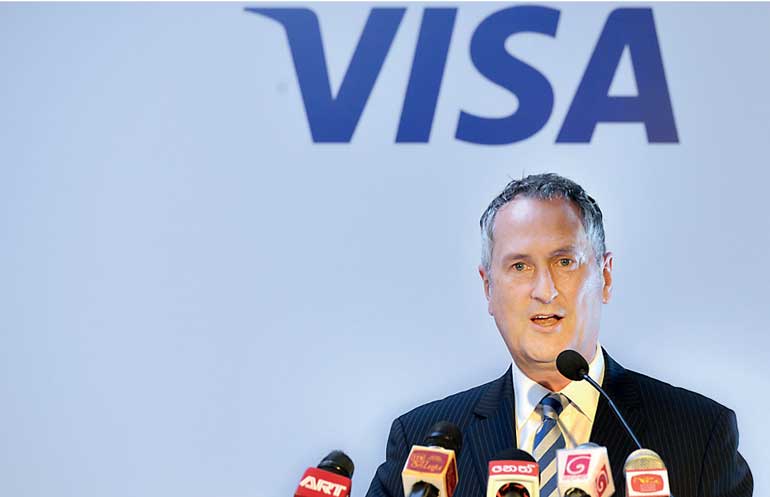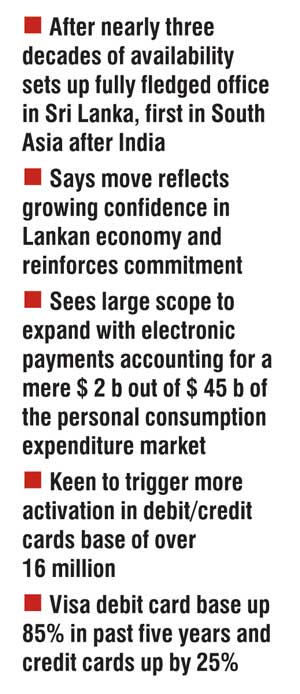Saturday Feb 21, 2026
Saturday Feb 21, 2026
Friday, 26 August 2016 00:01 - - {{hitsCtrl.values.hits}}

In a market in which it has existed for nearly three decades, global leader in payments technology, Visa, yesterday formally  announced the opening of a fully fledged office in Sri Lanka saying the move reflects
announced the opening of a fully fledged office in Sri Lanka saying the move reflects growing confidence in the economy and future of electronic payments.
growing confidence in the economy and future of electronic payments.
The company said that with electronic payments amounting to only around $ 2 billion out of a $ 45 billion personal consumption expenditure market, the future in Sri Lanka for digital commerce along with economic growth looked very promising.
“There is a tremendous upside in Sri Lanka to boost electronic payments. The Government has also kicked off a strategy to develop digital infrastructure and electronifcation of commerce. With higher prospects for economic growth, Sri Lanka is a definitive place to set up a permanent office,” Visa Asia Pacific Group Executive Chris Clark told journalists yesterday in Colombo.
“The opening of an office in Sri Lanka is a great reflection of growth opportunity in electronic payments and the Sri Lankan economy,” Clark added.
The office in Colombo is Visa’s second in South Asia after India and is an investment out of its Singapore operations.
“The move also reinforces our commitment to Sri Lanka and the high potential electronic payment industry. It will benefit our customers, businesses and the Government. We are excited about the future, to bring new innovations to Sri Lanka,” Clark told the media along with Visa India and South Asia Group Country Manager T.R. Ramachandran and Sri Lanka Country Manager Anthony Watson.
Having been present in Sri Lanka since 1989, the officials said Visa has a strong relationship with card issuers, merchants, customers and the Government.
Serving over 200 countries and territories with fast, secure and reliable electronic payments, Visa operates one of the world’s most advanced processing networks, VisaNet, which is capable of handling more than 65,000 transaction messages a second, with fraud protection for consumers and assured payment for merchants.
“Sri Lanka is a priority market for Visa in South Asia and one where we see tremendous opportunity for the growth of electronic payments,” Ramachandran said.
It was revealed that activation of the estimated 16 million plus debit, credit and ATM cards in Sri Lanka was just below 3%, which throws open an unprecedented opportunity. Visa finds the fact that 85% of Lankan households have access to finance heartening in its quest to expand electronic payments in Sri Lanka.
Visa also said the cost for the economy carrying cash was high and a faster movement to electronic payments will improve efficiency, convenience and security. “All stakeholders need to unite and push towards promoting electronic payments to enable Sri Lanka to leapfrog,” Ramachandran added.
At present the card-accepting merchants base is around 40,000 as consumer preference for convenience grows, the industry needs to expand while state sector utilities such as electricity and water need to embrace electronic payments. In that context Visa believes all players have room for huge growth in Sri Lanka.
Visa is encouraged by the high mobile telecom penetration in Sri Lanka as well as the Government-backed Google Loon project that aims to provide affordable Internet to a wide segment of the population and efforts to enhance financial inclusion.
Going forward, Visa also expects start-ups and small and medium enterprises to opt for electronic payments.
“Overall there are many decadal growth opportunities in Sri Lanka whilst South Asia has been one of the strongest growth regions for Visa,” Asia Pacific Chief Clark pointed out.
Visa Country Manager Watson said electronic payments could have a truly profound impact on both the people of Sri Lanka and the country’s economy.
According to him, over the past five years Visa’s debit cards base has grown by 85% while its credit card base has swelled by 25%.
“In my role I’m going to be focused on growing the electronification of commerce as we transition cash payments to electronic payments across the country. In doing so, we will be providing Sri Lankan people with easier and more secure access to their funds, supporting local businesses to grow, encouraging tourism and helping to stimulate economic growth. I’m excited to be on the ground here in Sri Lanka and I’m looking forward to working closely with our clients, businesses and the Sri Lankan Government to achieve this vision.”